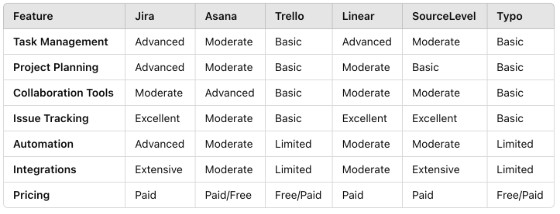Engineering management has become increasingly crucial to ensuring successful project execution. Organizations are constantly seeking ways to streamline the management of engineering teams, improve collaboration, and optimize workflows. This demand has led to the development of engineering and execution software solutions called software engineering management tools. These tools are designed to facilitate smoother team coordination, improve project tracking, and automate repetitive tasks.
This article will analyze the benefits of engineering management software, explain what it entails, detail its important features, and share strategies for choosing the best project management software for engineers to meet your team’s goals.

What is engineering management software?
Engineering management software is a specialized tool used to manage the entire lifecycle of engineering projects, from initial planning and execution to ongoing monitoring and final delivery.
These platforms consolidate:
- Project milestone tracking
- Resource management
- Team collaboration
Engineering management software is designed to support engineering teams who regularly face the challenges of strict deadlines, complex workflows, and vast amounts of technical data.
A key purpose of engineering management software is to monitor the advancement of engineering tasks, guaranteeing projects are delivered on schedule and within financial constraints.
Providing a shared space for updates, task assignments, and issue tracking strengthens communication among team members. Additionally, the automation functionalities in many engineering management tools help minimize the effort needed for repetitive administrative tasks like scheduling, reporting, and timeline updates.
For example, consider a team of engineers working on a product design project. Engineering management software helps streamline task assignments, milestone tracking, and report generation for project managers.
Key features of engineering management software
To comprehend what modern engineering teams require management software for, it’s essential to examine the primary capabilities of such tools:
- Task management and assignment: One of the core features of engineering management software is task tracking. Engineers can create tasks, assign them to team members, and set deadlines. This feature guarantees that no task falls through the cracks and that the team remains focused on their objectives.
- Real-time collaboration: Flawless coordination among engineers, project managers, and external collaborators is vital for engineering projects. Management tools streamline real-time communication, document sharing, feedback, and updates, reducing the need for extended email chains or frequent meetings.
- Progress tracking and reporting: These tools offer detailed dashboards and reporting functionalities, giving project managers insights into task progress, resources, and deliverables. Gantt charts and Kanban boards provide visual timelines to help teams stay on track.
- Automation: Software solutions for engineering management provide automation capabilities that minimize the administrative workload for the teams. Automating routine tasks like meeting scheduling, reminder notifications, and project timeline updates allows engineers to focus on the essential elements of their work.
- Resource management: Any engineering project will place a high value on the efficient allocation of resources. The use of engineering management software ensures that the manager can monitor available resources, including human resources, budgets, and equipment, so as to optimize the use of all the resources with respect to the project objectives.
- Integration with other tools: Engineering teams frequently employ a number of software tools, from design platforms to code repositories. Engineering management software integrates with these tools to ensure smooth data flow and centralize project-related information.
Benefits of engineering management software
Let’s discuss the key benefits it provides:
- Improved productivity: Many engineering management platforms feature robust analytics and reporting tools, helping project managers evaluate team performance. This enables trend analysis, workflow improvements, and better execution of upcoming projects.
- Enhanced collaboration: These tools remove barriers and promote communication and collaboration by providing a unified system. Engineers, project managers, and stakeholders can easily access discussions and information about the updated progress of particular projects, regardless of their physical location.
- Better project visibility: One of the biggest challenges in engineering projects is managing the progress of multiple tasks. With real-time insights into progress, resource usage, and potential problems, engineering management software helps teams and project managers make quicker decisions and resolve issues efficiently.
- Reduced errors and risk: Automation with real-time monitoring eliminates the possibility of human errors. They ensure smooth project management and offer risk management features to preempt and manage risks effectively.
- Scalability: As engineering teams expand, project management becomes increasingly complex. Engineering management tools are dynamic with respect to your team’s requirements, meaning you can converse even with the most complex projects without compromising on organization or efficiency.
- Data-driven insights: Many engineering management tools provide analytics features and robust reporting that give project managers insights into the team’s performance. By analyzing this data, managers can identify trends, improve workflows, and optimize future project execution.
How do you choose the right engineering management software?
Finding the perfect engineering management software may feel challenging due to the abundance of choices.
So, use these suggestions to identify the best tool for your team:
- Assess your team’s needs: Engineering teams have diverse requirements influenced by their workflow, size, and the nature of their projects. Focus on the elements your team prioritizes, such as task tracking, collaboration, and reporting tools.
- Consider integration: The software should integrate with tools your team already uses, like code repositories, design platforms, or communication tools. Integration decreases friction and increases workflow efficiency.
- Ease of use: The software used in engineering management must be user-friendly and straightforward. If the tool requires extensive training, it may slow down your team instead of helping it.
- Scalability: Select a tool that will support your team’s growth. The software should scale up with the team as the project’s requirements change.
- Cost: Although feature-heavy software might be attractive, be sure that it fits your budget. Consider free trials or tiered pricing structures to find the optimal value.
Top engineering management software options

Engineering teams have access to a broad range of management tools, each designed to suit specific workflows.
Here’s a look at some popular ones:
Jira
Jira is a commonly used tool for software development and engineering project management. Its features include effective task management, bug tracking, and integration with GitHub and Bitbucket, among other tools. Jira is perfect for Agile teams; it supports Scrum and Kanban models.
Asana
Asana is a flexible project management system that fits the needs of teams, regardless of their size. It provides task management, project schedules, and resource tracking, ideal for engineering teams seeking a blend of functionality and simplicity.
Trello
Trello is an intuitive and visual system that includes boards, lists, and cards to handle tasks. Great for smaller groups or less demanding projects, it might, however, lack certain advanced features needed by larger engineering teams.
Linear
Linear is an issue-tracking and project-management tool known for its fast performance and sleek interface. It’s particularly favored by teams working on software engineering projects.
SourceLevel
SourceLevel focuses on providing insights into the productivity of engineering teams, with a strong emphasis on tracking GitHub activity and developer workflows. It’s useful for teams that prioritize version control and code management.
Typo
Typo is a simple project management solution intended for small teams. It is intended for engineering teams working on smaller projects and includes basic task tracking and collaboration features.
If you’re having trouble selecting a tool from this list, here’s a comparison of all detailed features to help make things easier for you.

Common mistakes to avoid
When adopting engineering management software, it’s essential to avoid these common pitfalls:
- Overcomplicating the process: Some teams overcomplicate their workflows by trying to use every feature available. Focus on the essential features that will benefit your team and streamline your processes.
- Lack of training: Lack of employee software training can lead to employee discontent, which could raise issues regarding productivity. It is critical to provide sufficient training and ensure that everyone understands how to use the tool effectively.
- Ignoring integration needs: If the software isn’t compatible with other tools your team relies on, it can create disjointed workflows. Confirm that your software integrates well with all platforms.
- Not regularly reviewing data: Many teams forget to review performance data and reports generated by their software. Regularly exploring this data can provide valuable insights for improving workflows and processes.
Concluding Thoughts
Engineering management software is essential for engineering teams seeking to boost production, efficiency, and cooperation. These technologies include:
- Task management
- Real-time interactions
- Resource allocation
- Automation.
This allows engineering teams to focus on addressing complex issues and innovating successfully.
Investing in the most suitable engineering project management software allows organizations to ensure streamlined processes, more effective decisions, and improved results from all work projects. When selecting software, consider its potential for growth, ease of integration, and ease of use to reap as much as possible from it.
With the correct engineering project software, teams can concentrate on providing creative solutions, generating development, and keeping ahead in today’s fast-changing technological world.

